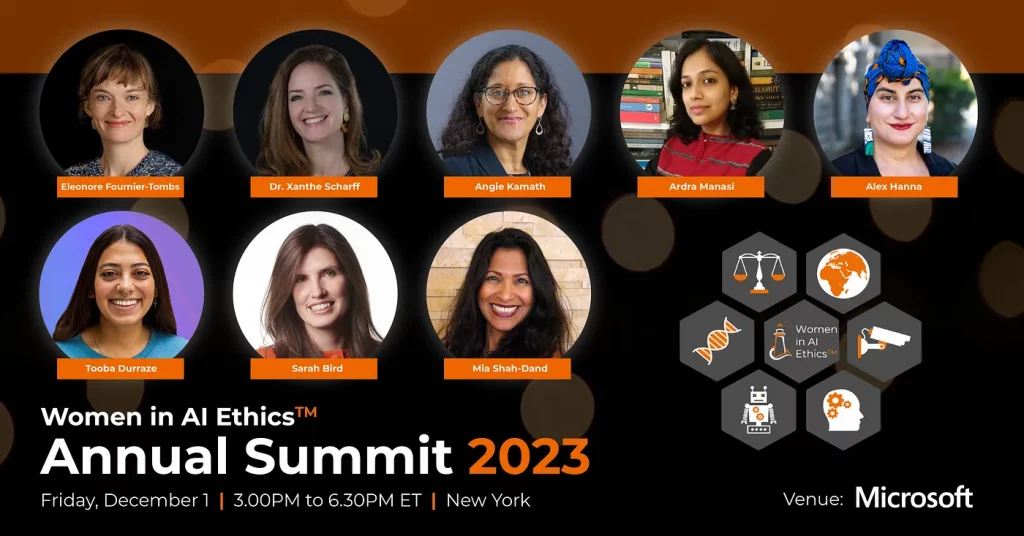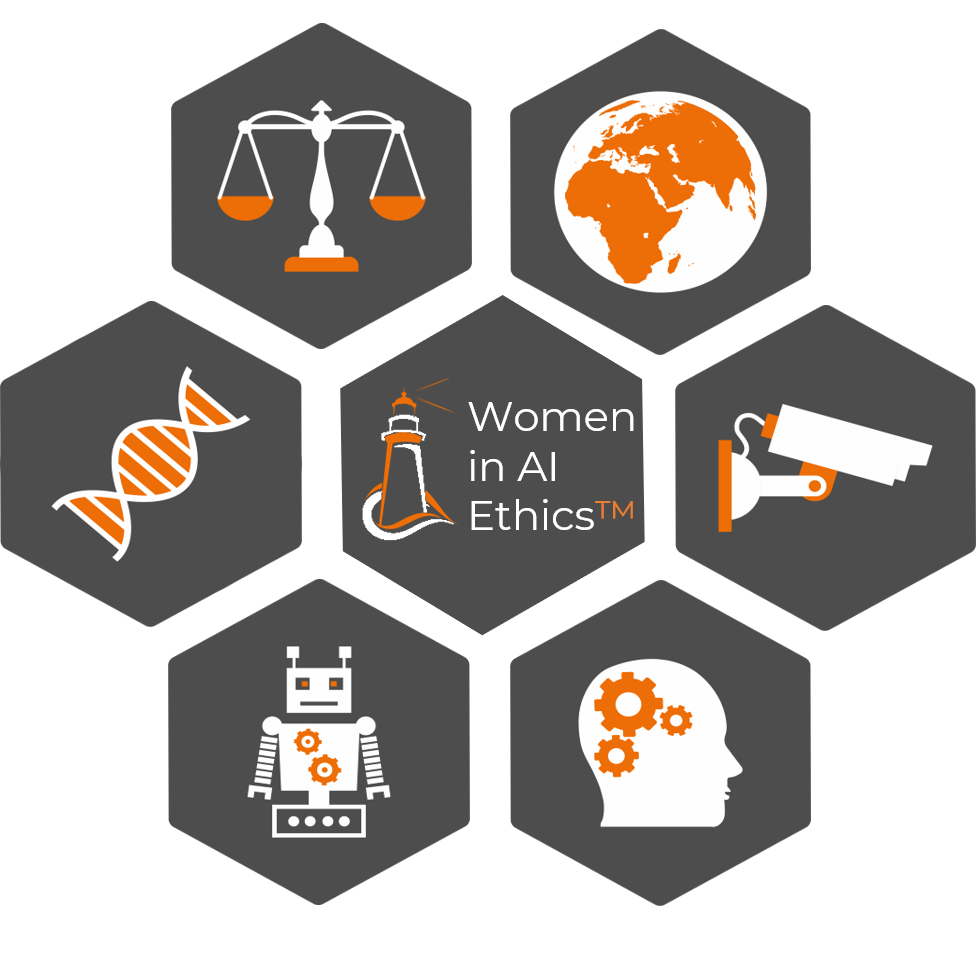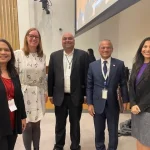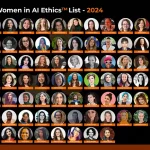
OVERVIEW
The rapid development and deployment of Artificial Intelligence (AI) is poised to reshape the future of work, the global economy, and societal norms. While AI offers unprecedented opportunities, there is growing evidence that it will widen existing inequities, particularly among women, and create new socio-economic divides.
Women make up nearly 50 percent of the total global workforce but they only account for one third of the technology workforce [1]. The lack of women on tech development teams and at industry conferences is often attributed to fewer women taking Science, Technology, Engineering, and Mathematics (STEM) courses in higher education, and referred to as the “STEM pipeline gap.” However, this simplistic narrative deflects attention from the pervasive erasure of contributions by talented women who are already in this field, further perpetuating harmful tropes and stereotypes. Exclusion of women and experts from underrepresented communities shows up as embedded bias in AI models and systems developed by homogenous teams, which amplify existing inequities.
Globally, in addition to exclusion and erasure, women also face economic risks from AI displacement [2]. 8 out of 10 women in the U.S. workforce are in occupations highly exposed to generative AI automation and overall, 21% more women are exposed to AI automation [3]. Women are 1.5 times more likely to need to move into new occupations than men [4]. Recent studies show that women may be lagging behind men in their adoption of AI [5]. Men are also benefiting more from increased interest and investments in AI while access to funding continues to be more difficult for female founders [6]. If women are unable to make transitions to the new AI economy successfully, they face a growing income gap and risk being left further behind.
This summit is hosted by Women in AI Ethics™ (WAIE) and it will bring together visionary leaders from diverse sectors to discuss, deliberate, and devise strategies to ensure that the benefits of AI are equitably distributed, women are empowered to fully participate in the AI economy, and we do not lose the critical gains in gender equity and equality over the past decade.
Women in AI Ethics™ is a fiscally sponsored project of Social Good Fund, a California nonprofit corporation and registered 501(c)(3) organization (Tax Id: 46–1323531). Our mission is to increase diversity and inclusion in the AI/tech industry by elevating underrepresented ethical voices and providing mentoring programs to support the next generation of diverse AI talent. We also keep our communities safe from the harms of AI and prepare workers for new opportunities through AI literacy & reskilling programs. You can support our work here.
PANEL I: BRIDGING THE GENDER DIVIDE IN AI — 3.55PM to 4.30PM
This discussion will review the multi-dimensional challenges faced by women globally, including systemic barriers, exclusion from the technology workforce, and displacement due to AI automation. The panel will discuss solutions that address not only the AI technologies themselves, but also broader issues of gender equality, gender rights and economic empowerment of women.
Panelists:
● Eleonore Fournier-Tombs (UNU) https://www.linkedin.com/in/eleonoreft/ (Moderator)
● Xanthe Schaffer (The Fuller Project) https://fullerproject.org/
● Ardra Manasi (CIWO) https://www.linkedin.com/in/ardramanasi/
2023 Gender Social Norms Report (UNDP and UN Women)
Globally, the rapid development and deployment of AI technologies have given rise to an increasing number of risks for women and marginalized groups. These harms range from higher rates of error for dark-skinned women in facial recognition systems and amplification of sexist stereotypes by machine learning models. Historical discrimination has led to women being on the other side of the digital divide, with major implications for gender equity and equality in tech. While there are many opportunities in AI for women, there is an urgent need to ensure they are included and recognised at all stages of development and deployment to ensure these technologies meet their needs and policies are in place to safeguard their interests. This expert panel will review regional trends and explore strategies for women’s full participation in the AI economy.
Guiding Questions:
1. How are AI advancements and recent developments affecting women from an economic and labor perspective?
2. How are the challenges faced by women in accessing and leveraging AI technologies different from those faced by men?
3. What kind of programs would be most helpful for women in sectors that are most vulnerable and at greater risk of being displaced by AI?
4. What are some concrete solutions (such as labor protections and related policies), which could begin to close the AI divide?
5. What could we do to further ensure full participation by women and marginalized groups in the AI economy?
PANEL II: AI RESKILLING AND LITERACY — 4.45PM to 5.20PM
In this discussion, we will explore new effective strategies for building AI reskilling programs, investments to make AI literacy resources more accessible, and development of new onramps to enable women’s full participation in the AI economy.
Panelists:
● Tooba Durraze https://www.linkedin.com/in/tooba-durraze-73701444/ (Moderator)
● Alex Hanna (DAIR) https://www.linkedin.com/in/alex-hanna-ph-d/
● Angie Kamath (NYU School of Professional Services) https://www.linkedin.com/in/angie-kamath-214b2236/
[Women in AI Ethics “AI for Communities” literacy program for public libraries]
Overview:
As Artificial Intelligence (AI) reshapes industries across a wide range of sectors and regions, it is imperative that we acknowledge its impact on our workforce along with the new opportunities it presents. The accelerated pace of AI adoption threatens to exacerbate existing gender inequities and increases the risk of women and others from underrepresented communities being further marginalized. There is an urgent need for AI reskilling programs tailored for women in professions that are most exposed to displacement by AI-led automation and designing of new curriculums that recognize the importance of STEM as well as non-STEM backgrounds. In this discussion, we will explore new effective strategies for building AI reskilling programs, investments to make AI literacy resources more accessible, and development of new onramps to enable women’s full participation in the AI economy.
Guiding Questions:
1. Why is it imperative for women, especially from marginalized communities, to be AI-literate?
2. How can AI literacy programs be designed to be culturally sensitive, inclusive, and tailored to the unique needs of people from diverse (incl. non-technical) backgrounds?
3. What challenges do women face in accessing current AI reskilling programs, and how can these be overcome?
4. What role can public and private sectors play in promoting and investing in AI literacy and reskilling for women? Are there successful partnership models to emulate?
5. How can we ensure continuous learning and adaptability as AI and related technologies continue to evolve?
This convening is more than just an event, it is a call for collective action. By bringing together thought leaders, policymakers, technologists, and grassroots activists, Women in AI Ethics will start mapping out a blueprint that places women at the center of the AI revolution to ensure they are contributors, beneficiaries, and leaders in shaping an inclusive AI-powered future.
PROGRAM DETAILS
DOORS OPEN & REGISTRATION — 3.00PM to 3.30PM
OPENING REMARKS — 3.30PM to 3.50PM
● Mia Shah-Dand (Women in AI Ethics™) https://www.linkedin.com/in/miadand/
● Sarah Bird (Microsoft) https://www.linkedin.com/in/slbird/
DISCUSSION I: BRIDGING THE GENDER DIVIDE IN AI — 3.55PM to 4.30PM
This discussion will review the multi-dimensional challenges faced by women globally, including systemic barriers, exclusion from the technology workforce, and displacement due to AI automation. The panel will discuss solutions that address not only the AI technologies themselves, but also broader issues of gender equality, gender rights and economic empowerment of women.
Panelists:
● Eleonore Fournier-Tombs (UNU) https://www.linkedin.com/in/eleonoreft (Moderator)
● Xanthe Schaffer (The Fuller Project) https://www.linkedin.com/in/xanthescharff/
● Ardra Manasi (CIWO) https://www.linkedin.com/in/ardramanasi/
5 YEARS OF WOMEN IN AI ETHICS™ — 4.30PM to 4.40PM
Journey through WAIE’s eventful history, key milestones, and the global community it has nurtured since 2018.
DISCUSSION II: AI RESKILLING AND LITERACY — 4.45PM to 5.20PM
In this discussion, we will explore new effective strategies for building AI reskilling programs, investments to make AI literacy resources more accessible, and development of new onramps to enable women’s full participation in the AI economy.
Panelists:
● Tooba Durraze https://www.linkedin.com/in/tooba-durraze-73701444/ (Moderator)
● Alex Hanna (DAIR) https://www.linkedin.com/in/alex-hanna-ph-d/
● Angie Kamath (NYU School of Professional Studies) https://www.linkedin.com/in/angie-kamath-214b2236/
CLOSING REMARKS — 5.20PM to 5.30PM
● Announcement of “100 Brilliant Women in AI Ethics” for 2024
NETWORKING MIXER — 5.30PM to 6.30PM


